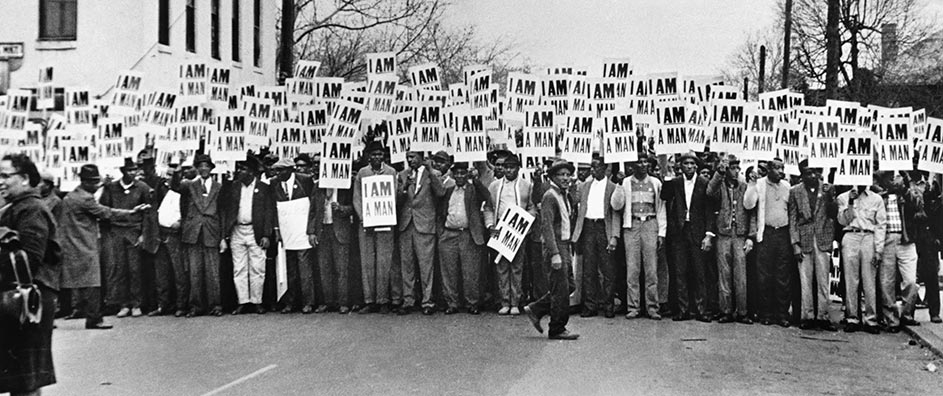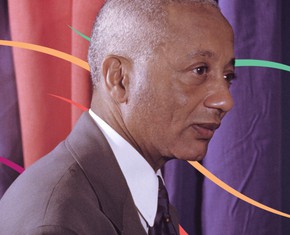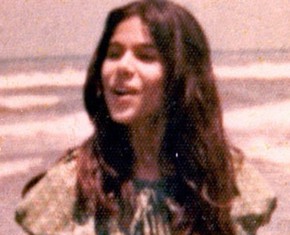The views expressed in our content reflect individual perspectives and do not represent the authoritative views of the Baha'i Faith.
When we think of the civil rights, anti-racism and anti-apartheid movements around the world, we think of famous leaders like Nelson Mandela, Fannie Lou Hamer and the Reverend Dr. Martin Luther King, Jr. But before their brave activism, who laid the foundations for those powerful movements? Many expert scholars now point to Dr. Alain Locke, the African American Baha’i philosopher and intellectual architect of the Harlem Renaissance.
In the words of Louis Gregory, an African American attorney with whom Alain Locke took a Baha’i teaching trip in the South:
While the world may have many interracial movements, all the bridges implied in them cross a yawning chasm. A bridge separates as well as unites. But the Baha’i plan removes the bridges and closes the chasm. It dwells not upon mere formalities, but common faith. Baha’i activities gather the friends in a oneness of spirit that is destined to prove what religion can accomplish. – Louis C. Gregory, “Accelerated Progress in Race Relations,” in The Baha’i World, Volume 9, p. 877.
Both Gregory and Locke understood these words of Baha’u’llah:
O Children of Men! Know ye not why We created you all from the same dust? That no one should exalt himself over the other. Ponder at all times in your hearts how ye were created. Since We have created you all from one same substance it is incumbent on you to be even as one soul, to walk with the same feet, eat with the same mouth and dwell in the same land, that from your inmost being, by your deeds and actions, the signs of oneness and the essence of detachment may be made manifest. Such is My counsel to you, O concourse of light! Heed ye this counsel that ye may obtain the fruit of holiness from the tree of wondrous glory. – Baha’u’llah, The Hidden Words, p. 20.
A prolific writer and lecturer, Locke sought to define the issues that held black people back, and to offer solutions to bring about a sense of unity in diversity, thereby dissolving issues of racism:
If interracial unity—beyond racial justice—was Martin Luther King, Jr.’s “dream” for America, it was also Locke’s vision for the world. Locke prized unity. He had a disdain for black “self-segregation” as well as for Jim Crow segregation. – Christopher Buck, Alain Locke: Faith and Philosophy, p. 277
Buck asserts that “Alain Locke democratized American culture and paved the way for the Civil Rights movement.” – Ibid., p. 1. He further opines that:
Without Locke, there may not have been a Martin Luther King. The New Negro movement, for which Locke was the chief architect and spokesman, was singularly responsible for inculcating and cultivating the requisite group consciousness and solidarity necessary for the mobilization of African Americans during the Civil Rights era. – Ibid.
Dr. King himself, in a talk given at Emory University, acknowledged the important role Locke played in the development of the civil rights movement:
We’re going to let our children know that the only philosopher[s] who ever lived [were] not Plato and Aristotle, but W. E. B. Du Bois and Alain Locke came through the universe. – Rev. Martin Luther King, Jr., “Rally Speech, Mississippi Tour, Clarksdale, Mississippi, Pre-Washington Campaign,” March 19, 1968.
Knowing from personal experience the importance of education in helping to break down racial barriers, Alain Locke also became involved in promoting adult education and encouraging African Americans to enroll in classes. Buck noted that:
For the 1946-47 term, Locke was elected president of The American Association of Adult Education, the first black president of a predominantly white organization. – Christopher Buck, Alain Locke: Faith and Philosophy, p. 191
There is so much more to Locke’s story. These two short essays barely scrape the surface. To learn more, read these biographies: Alain Locke: Faith and Philosophy, by Dr. Christopher Buck, and Alain L. Locke: the Biography of a Philosopher, by Leonard Harris and Charles Molesworth. Read them for a wider and deeper appreciation of Dr. Locke’s profound spiritual commitment to the achievement of justice and equality.
You May Also Like
Comments

















Giving praise to Alain Locke, a leader of all leaders, in his movement for justice and equality is praiseworthy especially now that there’s still so much to accomplish. In the world we live in today, oftentimes it appears not much has changed—yet, so much has. We have to keep moving toward a better society in a whole. And what better way to be inspired, than by reflecting on great leaders that helped to get us to where we are today.